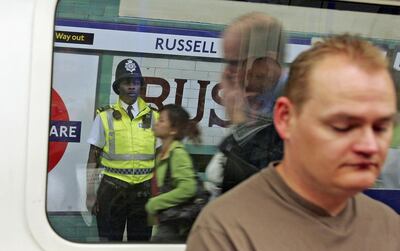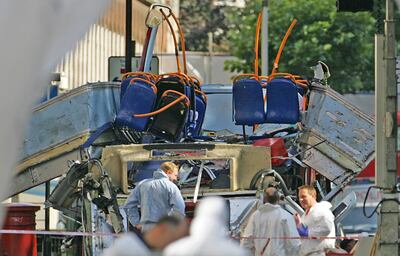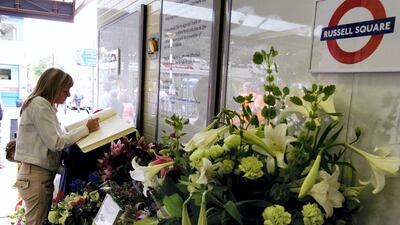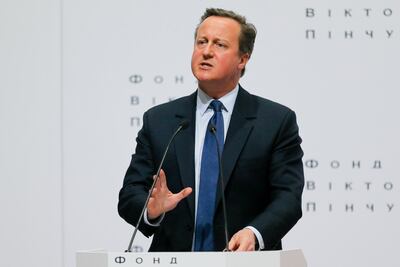I have been involved in counter-extremism and counter-terrorism work since the 7/7 attacks in London. I was one of 100 British Muslims that the then-prime minister, Tony Blair, convened in Windsor to reflect on why extremism had taken root in some parts of British Muslim communities. This was after multiple terrorist attacks against Londoners going to work, and I remember the ensuing chaos that the attacks caused and the multiple loss of lives in the heart of the British capital.
Two weeks later, another planned terror attack failed. The reason that the explosives did not go off was because the perpetrators – Ramzi Mohammed, Muktar Said Ibrahim, Husain Osman and Yassin Omar – did not have the technical expertise that was provided to the 7/7 bombers by Rashid Rauf, an Al Qaeda operative who was a dual British and Pakistani national. Born in Birmingham, Rauf was also implicated in the 2006 plot to bomb a transatlantic commercial aircraft that so changed the way that we all experience air travel today. In 2008, he was killed in a drone strike.
That same year, the British government developed the Preventing Violent Extremism programme, based on engagement with communities through local authorities. Dogged by claims of funding groups that were “part of the problem”, and holding ‘tea and samosa’ get-togethers jazzed up as counter-terrorism work, Prevent was slammed by the Conservative Party, which was then the opposition. To me, in hindsight, those years were wasted, with activists and civil society groups grappling with questions of whether a counter-terrorism strategy should focus on only violent extremism or both extremism and violent extremism.
It was only in 2010 that a National Security Strategy identified terrorism as one of the four highest risks we face. A Prevent review conducted in 2011 was followed four years later by the publication of a UK counter-extremism strategy. This document was published as part of an ongoing drive by former prime minister David Cameron, to take a more muscular, liberal defence of the social values of the UK. It promised a great deal. It also attempted to define extremism. Challenging extremists, the text states, requires us to “challenge their ideology, and defend and promote the values that unite us.”

As for the consequences of extremism, the text lists a weakening of the social fabric, unabated violence, the erosion of women’s rights and discrimination on the basis of gender, race and religion.
That is all well and good, but the reality is that these noble words have been just that – words. Over the last five years, Islamist groups who see their whole identity through the lens of restrictive and brittle interpretations of Islam have been pumping out social media and online campaigns suggesting that British Muslims are somehow at risk. “Islamic values”, these groups allege, are being undermined by liberal social values. They push the narrative that the UK Government is inherently “Islamophobic”, seeks to capture vast quantities of data on British Muslims under counter-terrorism programmes and that there are no such groups as Ahmadi Muslims.
What they are doing is, in effect, to chisel sections of British Muslims away from engagement with statutory state structures and instil in them a belief that these groups alone are their 'guardians’. It is classic Islamist extremist campaigning, which I have seen in countries like Egypt under the Muslim Brotherhood and in other North African states. In this assault on the hearts and minds of British Muslims, these Islamist groups have set about smearing any Muslim who dares to question them or their values or who chooses to work with government. Additionally, groups who are supported by the UK Government are also maligned by attempts to damage their reputations through stories that are patently untrue, though written in a manner that reduces the groups’ chances of recourse through UK libel laws.

In all of this, civil servants in key government departments such as the Home Office rarely challenge taxpayer-funded groups as to why they don’t publicly call out the extremists. In fact, civil servants have bought into the view pushed by some civil-society leaders that they want to simply stay ‘off the radar’ in their delivery counter-extremist projects.
Round and round the cycle goes, with little public defence of the social values of the UK – though these civil society groups seem happy to take from the public purse, whilst letting the assault on social values in the UK continue unabated. Take, for example, how mosques are intimidated into fear by self-appointed, so-called Muslim moral guardians just for trying to host an exhibition about the history of Muslims who saved Jews during the Holocaust.
The problem is that once Mr Cameron left the premiership, much of the fight against extremist groups went with him. What has taken root is a reluctance right in the heart of British government institutions of taking the moral and social fight to extremists – particularly Islamists – for fear that it might push more British Muslims to these groups and that the label of ‘Islamophobic’ gets stuck on government departments.
So, where are we today? The Commission on Countering Extremism, led by Sara Khan, has repeatedly made clear that government must do more to support counter-extremist and counter-terror practitioners who are speaking out against extremist values; it has asked for better resourcing and communication support for civil society groups working in this area. However, there has been no real response to these calls by the Home Office apart from an acknowledgement of the commission’s work. We are once again back into the hand-wringing approach, when now is in fact the time for the government to take a multi-layered, dynamic approach to counter-extremism.
Lastly, I have repeatedly asked for investigations by the British government into the money flows to such groups. How are they operating on six-figure budgets and with increasing staff numbers when there is no transparency or explicit lines of funding that can be sourced? Who for example, is funding them, and where did they get their income from? These are legitimate lines of inquiry that need to be developed if we are to, as Mr Cameron said, defend our moral and social values. This current British government has a large majority in Parliament; it can choose to be bold or it can choose to carry on with the hand-wringing that has given Islamist extremists the space in which to win hearts and minds. Whatever it does, one thing is certain: it holds all of the cards going forward.
Fiyaz is the founder and director of Faith Matters, which works on countering extremism, community integration and monitoring hate crime work


